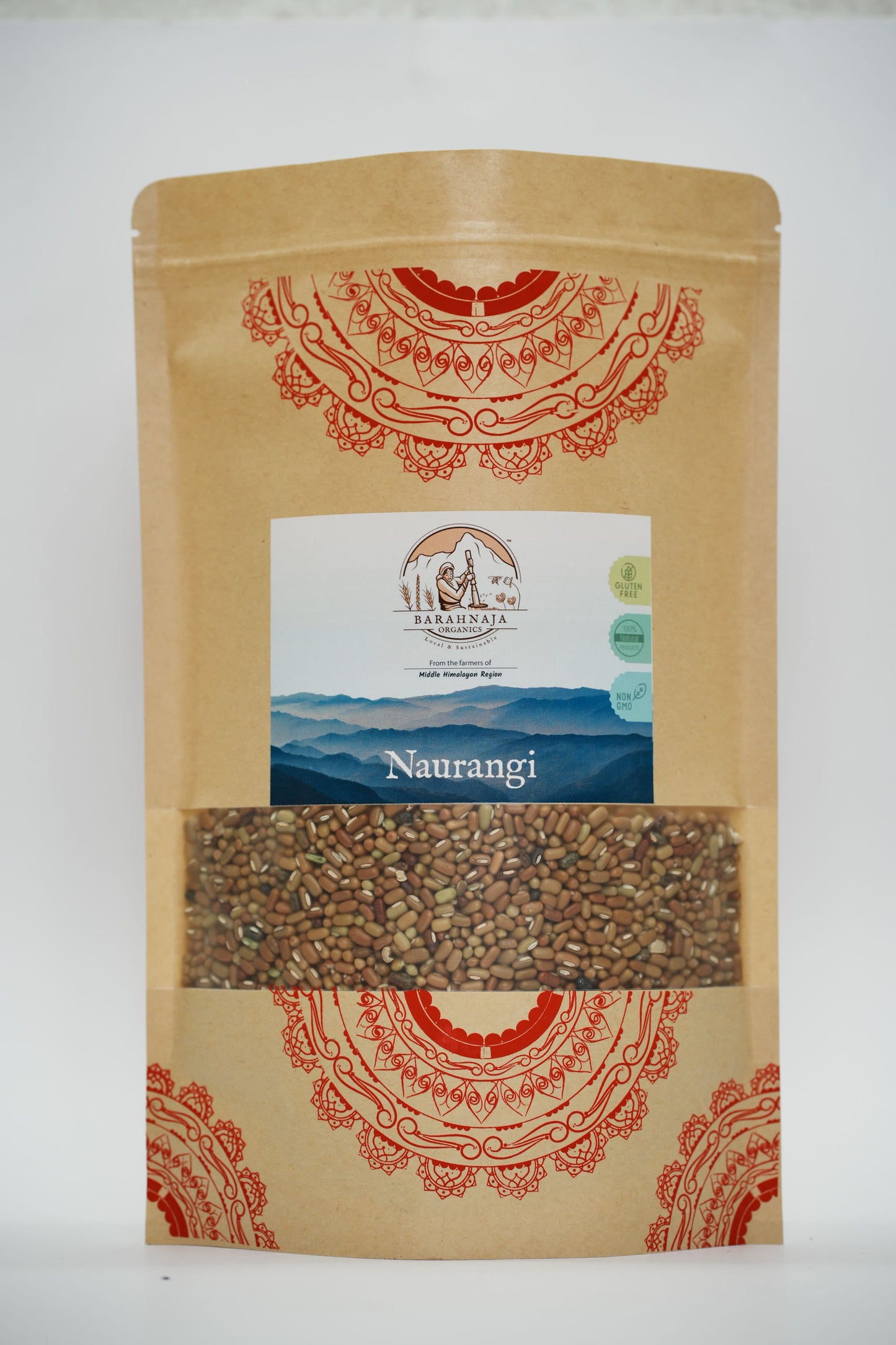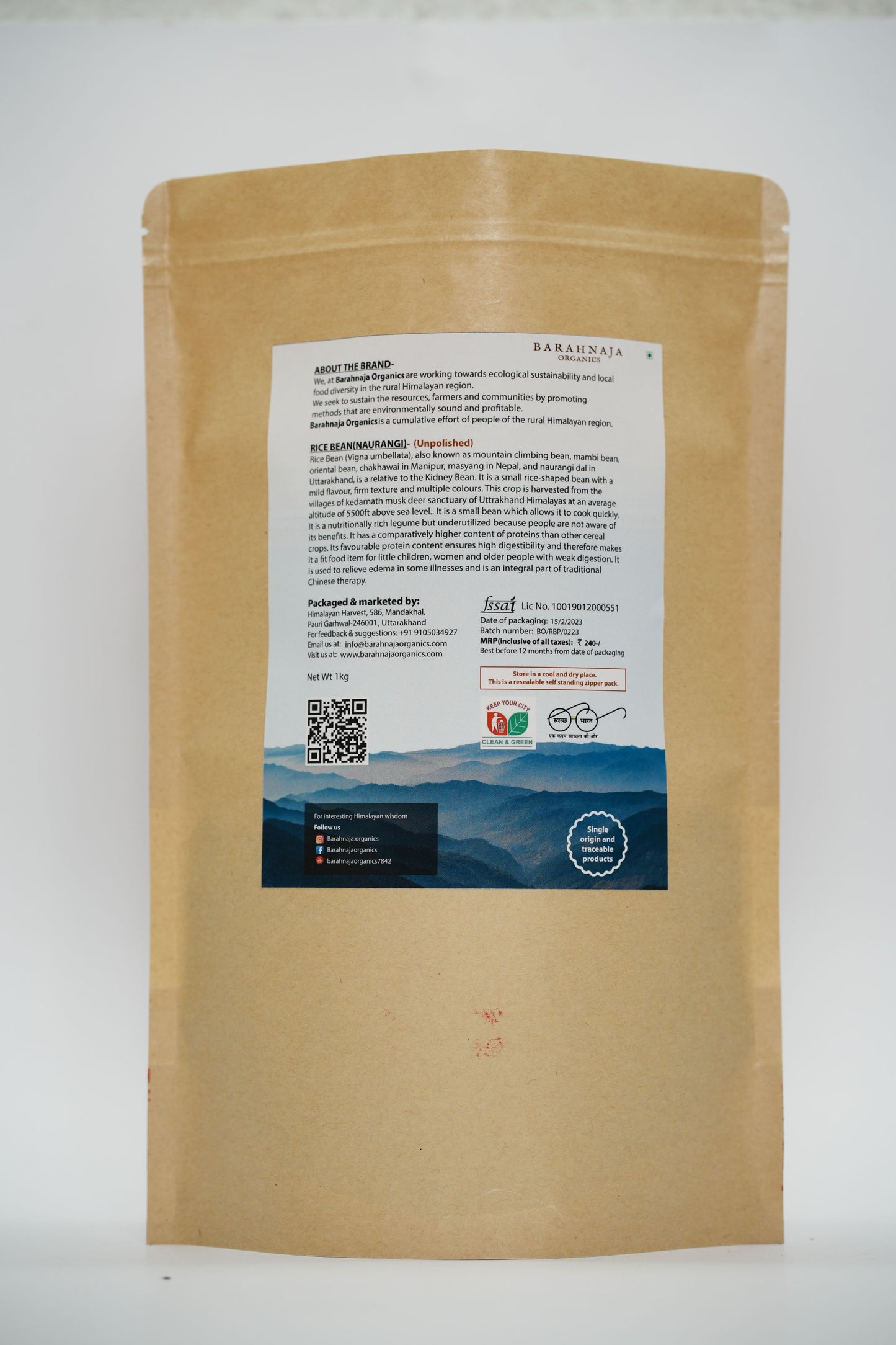Barahnaja organics
Rice beans
Rice beans
Middle Himalayan Region, Uttarakhand
5000 feet
Couldn't load pickup availability
About the brand
About the brand
We, at Himalayan Harvest, are working towards ecological sustainability and local food diversity in the rural Himalayan region.
We seek to sustain the resources, farmers and communities by promoting methods that are environmentally sound and profitable.
Himalayan Harvest is a cumulative effort of people of the rural Himalayan region.
Know Your Pulses
Know Your Pulses
Rice Bean (Vigna umbellata), also known as mountain climbing bean, mambi bean, oriental bean, chakhawai in Manipur, masyang in Nepal, and naurangi dal in Uttarakhand, is a relative to the Kidney Bean.
It is a small rice-shaped bean with a mild flavor, firm texture and multiple colors. It is grown primarily in the Kedarnath musk deer sanctuary of Uttarakhand Himalayas at an average altitude of 5000ft above sea level.
Benefits & Uses
Benefits & Uses
1. It is a small bean which allows it to cook quickly.
2. It is a nutritionally rich legume but underutilized because people are not aware of its benefits.
3. It has a comparatively higher content of proteins than other cereal crops.
4.It is used to relieve edema in some illnesses and is an integral part of traditional Chinese therapy.
5. Its favorable protein content ensures high digestibility and therefore makes it a fit food item for little children, women and older people with weak digestion.
Nutrition Information
Nutrition Information

Packaging Information
Packaging Information
Packaging designed to retain the goodness of pulses.
Shipping & Delivery
Shipping & Delivery
Shipping duration
Bluedart air- 3 to 7 days depending on the distance.
Storage
Storage
Keep your favorite Barahnaja organics grain and legumes in a cool and dry place in an air tight container/pouch.
Share


You Asked, we answered
FAQ's
How are your apples different from the regular market apples?
We at Barahnaja Organics work on Orchard to table model. We harvest our apples and dispatch it on the same day to our customers. So the produce that reaches you is single source, fresh and good to it. Market apples go through a big supply chain from farmers to end user, it ends up spending atleast 1 to 2 months in transit before it reaches you, thats why the apple is usually not crunchy and is stale most of the time.
What is apple size and grading and what is difference between selected pack and value pack?
Apple is graded according to its size in india. The diameter of the fruit determines the size, A 50 to 55mm diameter fruit is recognised as small and a 80 to 85mm is considered large.Though apples taste same irrespective of size, a large selected pack a found in a small quantity in an apple tree thats why it is priced premium.
What is the general shelf life of a Apple
Apples are generally a hardy fruit and has a decent shelf life. Our apples enjoy quite a lot of shelf life because of the fact that it is grown in high altitude region and the higher you go the harder the apple becomes. That is why the high altitude apples never make its way to the fruit market during season and end up in cold storage due to its good keeping quality and shelf life.
What are the shipping method available and how long does it take to reach the box?
We try to use the best shipping platform that is out there, majorly we use blue-dart surface and air and other major delivery services.
Usually it will take 3 days to reach in north india and 5 to 7 days to south.
What happens if the product is damaged or fruits have rotten?
In this case we refund the money back to the customer.
Is cash on delivery available?
Cash on delivery is not available as of now, but will be available soon!
Can we return the fruit back?
Return of fresh fruit is not avaliable. if the product is damaged or rotten in any case, then we would want the pictures of the box soon after delivery and if requirement meet we will refund the money back.
Who are we?
We are farmers based out in the Bhagirathi valley and we grow our own apples.


